Where do I start?
What do I bring to the table?
Will anyone care?
I wrote these questions at the beginning of a document on my personal computer called StartABlog.doc. So, for the sake of humoring myself and finally launching this blog, I’ll start by answering them below.
Where do I start?
I suppose I should start by introducing myself. My name is Andrea and I’m a doctoral student in Industrial/Organizational (I/O) Psychology. For those of you who aren’t quite sure what that means, I/O psychologists study the behavior of people at work and how work influences other aspects of life, including stress and family relationships. Our research focuses on topics relevant to society as a whole and also provides us with unique opportunities to recommend interventions or changes on a manageable scale that have the potential make real change for individual employees and their families.
What do I bring to the table?
For the past 6 months, I’ve been working in Organization Management and Development, part of the human resources (HR) department at a large organization. I’m fortunate to work at a company that not only understands the value that I/O research brings to HR, but also has the resources to employ entire teams of I/O psychologists. Even with these resources, it remains difficult to fully capitalize on every research opportunity that could inform decisions that impact our employees.
While the limitations of applying I/O research to a real world setting can be frustrating, I can’t help but think of the vast majority of organizations that don’t have these resources and the graduate students and professors in academia struggling to find real-world venues to collect data. Partnerships between academia and organizations exist today, but the relatively few I’ve experienced personally have suffered from competing priorities and a lack of alignment between the academic and the industry agendas. We can do better. We can find a way to rethink these partnerships and realign science and practice to achieve a true science-to-practice model at any scale.
Will anyone care?
Through this blog I plan to explore different ways of engaging people in a larger science-to-practice conversation – a conversation that is much larger than I/O Psychology or the even the HR field. While my personal view and experiences are grounded in I/O, I want to have a much more philosophical conversation about research and how a new generation of scientists can rethink the science-to-practice relationship. So will anyone care? I am excited to find out.
